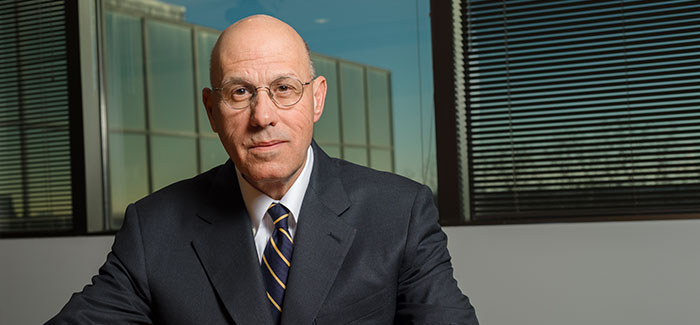
“There are not too many undergraduate programs left in the country with that level of rigor and seriousness of purpose,” Ken Kaufman, X’69, MBA’76, says. (Photography by Nathan Keay)
Show of support
Health care expert Ken Kaufman, EX’69, MBA’76, helps to keep the College vital.
As chair and managing director of Kaufman Hall, a health care management consulting firm, Kenneth Kaufman travels the country talking to health care organizations. This fall Kaufman, X’69, MBA’76, a longtime University volunteer and donor, will become chair of another entity: the College’s Visiting Committee.
Kaufman comes from a family with many UChicago connections—from his father, Felix Kaufman, AB’42, MBA’48, PhD’60; to his wife, Barbara, MST’81; to daughter Sara, MBA’10.
An East Coast transplant who lives in Kenilworth, Illinois, Kaufman believes it’s a great time to be involved with the University. “For anybody who graduated over the last 40 years, any of the good things that they remember are still there,” he says, “but now there are more of them.”
[[{"type":"media","view_mode":"media_original","fid":"1485","attributes":{"alt":"","class":"media-image","height":"10","style":"line-height: 1.538em;","typeof":"foaf:Image","width":"460"}}]]
What was your father’s experience at the University?
He was an extremely bright guy, but during the Depression his family didn’t have the money to send him anywhere. He went to New York State Teachers College in Albany for two years. One day a history teacher asked him to stay after class and essentially said, “Mr. Kaufman, why are you here?” The gentleman was a graduate of the University of Chicago and helped him transfer.
What was meaningful about your own time in the College?
I had a major in public affairs, which was an interdisciplinary social science program directed by Professor Gilbert White [U-High’28, SB’32, SM’34, PhD’42]. He was a distinguished geographer. Maybe 15 or 20 of us joined the public affairs program. Our studies were interdisciplinary and Professor White arranged for distinguished outside speakers. There were special study programs where everyone did a paper that required original thinking or original research. It was great.
You left the University and returned—why?
The period of time during which I was in the College was very tumultuous. There was unrest at the student level, issues around the Vietnam War. By 1970 I was married and had moved back to the East Coast. I got a job managing public health programs in southeastern New Hampshire, really enjoyed it, and became very interested in health care administration.
My intention was to be a health care executive. The University of Chicago had the best health administration program in the country, and many of America’s best hospitals were run by UChicago grads. I returned to the University and received my MBA in 1976, then took a job with a small health care consulting firm in Chicago. I started my own firm in 1985.
What does your company do?
Kaufman Hall provides services to hospitals and health systems in the United States. We have about 160 employees. We’re one of the largest private independent health care consulting companies in the country. We have very strong corporate finance skills, learned at the University of Chicago, but we also offer strategy services and merger acquisition services and own a software company.
The kind of corporate finance that many hospitals use is based on concepts that we introduced to the industry in the late 1980s. We have been significant contributors to the thought leadership of the industry, especially since 2008 as the country has moved toward health care reform.
How would you describe the current health care moment in our country?
It’s extraordinarily exciting. There’s experimentation and change going on all over the United States, and we don’t have a full understanding yet of where we’re going. Many of us are hoping that in ten years we’ll be in a place where we’re able to offer the American public health care with much more consistent quality at a much more affordable price. I’m cautiously optimistic.
You’ve been a member of and will now chair the College Visiting Committee. What does that involve?
I’m a great admirer of John W. Boyer [AM’69, PhD’75], who has done a fabulous job with the College in the time that he’s been dean. The results and the statistics all speak for themselves. The great thing about John is he’ll sit down and describe the kind of problems he’s facing and genuinely ask for contributions: advice, thoughts, wisdom. The UChicago Careers In program, including UChicago Careers in Business (UCIB), was originally an idea that came out of a Visiting Committee conversation.
How has the College changed since the 1960s?
The changes between the late ’60s and now are seismic. Now you have all the intellectual rigor but more of an organized tableau. For example, the University is encouraging more students to live on campus, in the dorms; the study abroad and career programs are highly organized and professionally managed.
You and your family have made annual gifts since 1977.
Over the years we’ve supported three aspects of the University. At Chicago Booth, we were donors for the Harper Center; there’s a study room named after my father in that building. We’ve given considerably to the College and have been big supporters of UCIB. We’ve been pleased to support the Urban Education Institute because my wife is a reading and literacy teacher and she’s also an education graduate.
Given the high cost of college, what’s the value added of a UChicago degree?
The value added is that it remains a completely serious curriculum. There are not too many undergraduate programs left in the country with that level of rigor and seriousness of purpose.
The College offers a unique product at this point in time. Keeping that uniqueness for students who are capable of taking advantage of it is really important, not only for the undergraduate community, but for the country. We should have a place like this.
